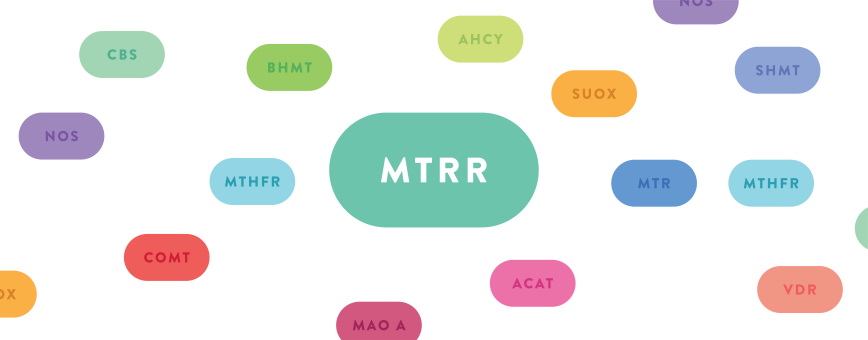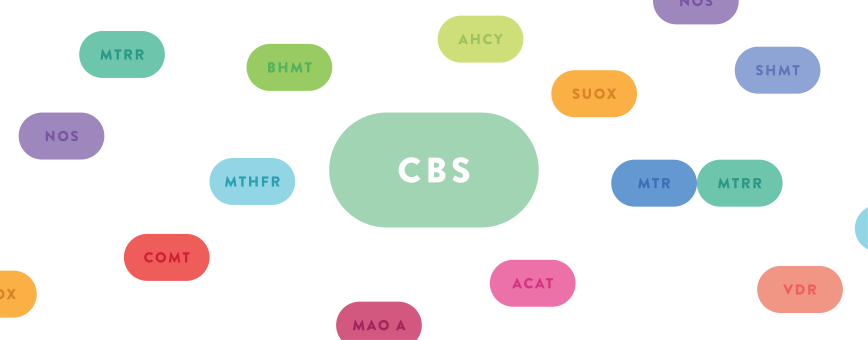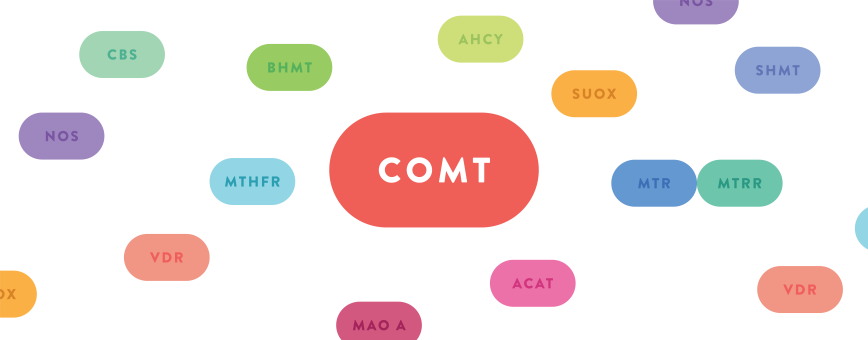The MTHFR gene gives your body instructions on how to make the enzyme methylenetetrahydrofolate reductase (MTHFR). This enzyme is involved in processing amino acids, which are the building blocks of proteins.1
The MTHFR gene product is located at a critical point in the methylation cycle. MTHFR helps your body maintain normal levels of homocysteine and methionine by facilitating an important reaction that converts a form of folate (vitamin B9) called 5,10-methylenetetrahydrofolate to a different form of folate called 5-methyltetrahydrofolate, which is the main form of folate found in blood.2 This reaction is needed for your body to be able to convert homocysteine (an amino acid) into methionine, which is a fundamental amino acid that your body needs.1
There are three SNPs in the MTHFR gene that Dr. Amy looks at in the DNA Nutrigenomic Test: MTHFR C677T, MTHFR 3, and MTHFR A1298C.
Several mutations in the MTHFR gene have been well characterized and have been associated with homocystinuria (inability for your body to process methionine), developmental delays, psychiatric disorders, later-onset neurodegenerative disorders, stroke, heart disease, cancer, and may play a role in miscarriages, as well as other health conditions.3-5
SNPs in MTHFR may display cumulative effects if you also have SNPs in MTR, MTRR, AHCY, or CBS.
I’m not sure if I have a MTHFR mutation, how can I find out?
Our DNA Nutrigenomic Test identifies a custom panel of 30 single nucleotide polymorphisms (SNPs), designed by Dr. Amy. This panel tests for 3 different MTHFR variations; C677T, 3, and A1298C
While there are thousands of genes and SNPs that can be examined, Dr. Amy has designed The DNA Nutrigenomic Test panel to focus on 30 SNPs that are part of the methylation cycle. This is a key nutritional pathway in the body that is central to health.
Many of the SNPs in Dr. Amy’s custom panel are in the control or regulatory portion of the gene, meaning these SNPs can have a significant impact on your health. These include some of the more unique SNPs on this panel and are not always covered by other DNA profile tests.
The analysis includes supplement suggestions based on personalized results and provides a comprehensive assessment of the methylation cycle. Proper function of the methylation cycle is essential for several key pathways in the body. When genetic mutations, or “weaknesses”, are present in this cycle, there may be increased risk factors for a range of health concerns. To learn more about the DNA Nutrigenomic Test and The Yasko Protocol, read our Getting Started Packet here.
How can I support my MTHFR mutation?
Nutrigenomic pathways are different between individuals and proper supplementation can help support specific imbalances. Holistic Health International offers a variety of supplements to support different MTHFR mutations within the SNP Support Category here.
Liver Well was originally named after those with MTHFR A1298C+ mutations. These capsules help support the natural production of BH4 to promote liver health and neurotransmitter balance, even if you don’t know your genetics.
You do not need to use every supplement listed in each category! Supplements are provided as options to discuss with your own health care professional, to gradually add in as you feel they are needed, and for additional consideration based on biochemical test results.
The beauty of looking at targeted SNPs in the methylation cycle is that it’s a nutritional pathway, meaning if you find a mutation or imbalance in your system, you have ways to support or bypass them.
The information expressed on this webpage does not constitute an attempt to practice medicine nor does it establish a doctor-patient relationship. Content on the site is for informational and educational purposes only. The information expressed is not meant to replace you working with a physician or health care practitioner.
Information and statements have not been evaluated by the U.S. Food & Drug Administration (FDA) and are not intended to diagnose, treat, cure or prevent any disease or be used as the basis for treating a particular symptom or disease. Any products discussed or endorsed are not intended to diagnose, treat, cure or prevent any diseases or be used as the basis for treating a particular symptom or disease. If you have specific healthcare concerns or questions about the products displayed, contact your licensed healthcare professional for advice or answers.
References:
1. MTHFR gene methylenetetrahydrofolate reductase. Accessed 2023, April 25. https://medlineplus.gov/genetics/gene/mthfr/
2. P42898 · MTHR_HUMAN. Accessed 2023, April 25. https://www.uniprot.org/uniprotkb/P42898/entry
3. Wan L, Li Y, Zhang Z, Sun Z, He Y, Li R. Methylenetetrahydrofolate reductase and psychiatric diseases. Transl Psychiatry. Nov 5 2018;8(1):242. doi:10.1038/s41398-018-0276-6
4. L. D. Methylenetetrahydrofolate Reductase Deficiency. In: Pratt VM SS, Pirmohamed M, et al., editors, ed. Medical Genetics Summaries [Internet]. Bethesda (MD): National Center for Biotechnology Information (US); 2012-; 2012 Mar 8 [Updated 2016 Oct 27].
5. https://www.ncbi.nlm.nih.gov/gene/4524. Accessed 2023, April 25. https://www.ncbi.nlm.nih.gov/gene/4524













